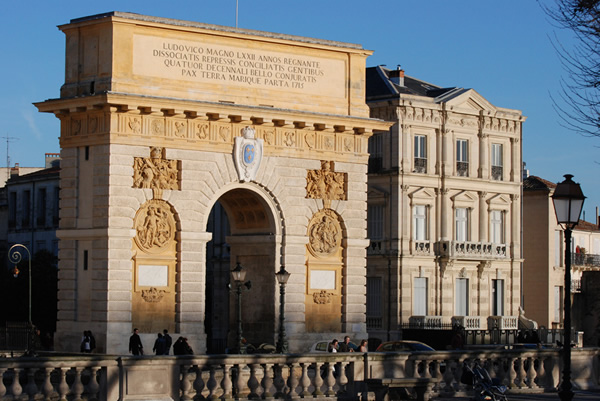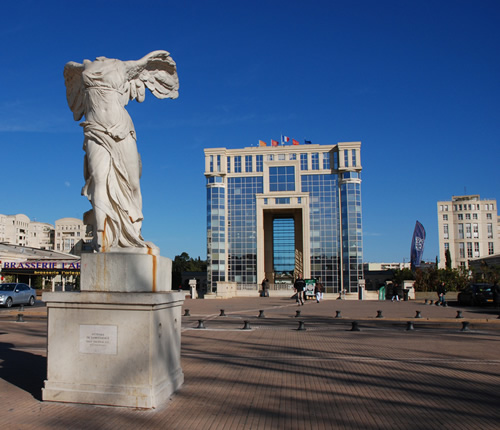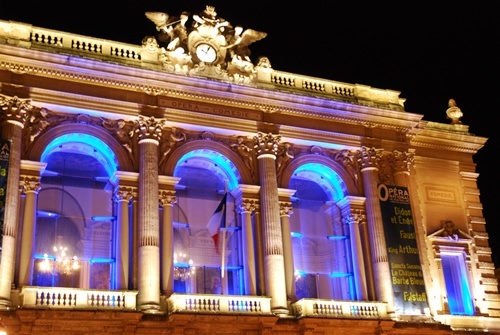Study French in Montpellier, France
A Variety of Language Schools in a Southern Cultural Center
Article and photos by Christina Rebuffet-Broadus
 |
|
Arch of Triumph near Peyrou Park in Montpellier.
|
Sea, sun, great food, and lots of fun. Sounds like a summer beach party, but these words could also describe learning French in Montpellier. In southern France, just 20 minutes from the Mediterranean coast, Montpellier prides itself as one of France's fastest-growing cities. One French student even called it "THE southern French city where the living is good." And with its 300 sunny days per year, modern transport system, and active cultural life, who's to argue?
The concentration of language schools and the dynamism of its student population make Montpellier the perfect destination apprendre le français, as the city calls itself. But as a former student at Accent Français points out, what also makes Montpellier a great place to study French is the local population's sensitivity to language learners — they will politely correct you, not automatically switch to English after hearing your accent-laden bohndjoor, and be patient as you try to use your newly learned vocabulary.
 |
| Winged Victory of Samothrace in the Antigone district of Montpellier. |
Here are some of the best language schools, approved by Montpellier's Tourism Office, to help you choose among the many.
Accent Français
Accent Français prides itself on its ultra-personalized service. Arriving students get an individual interview to determine their needs, and the staff actively helps in hacking through France's red tape jungle. The school even organizes evenings with the teaching staff to build group rapport. In keeping with the times, the school has its own constantly updated Facebook page — a great way to find out what the school is all about.
On a more academic side, Accent Français groups students into small classes of three to ten but also allows one-on-one tutoring for students with specific needs. Other options include conversation, exam preparation (DELF, TEF, and CCIP), and perhaps the most gratifying—cooking. Of course, full-fledged cooking and wine classes also show students why French cuisine merits its reputation. Accent Français has also designed a special +50 Senior course for older learners, which offers exciting cultural outings each afternoon.
In the words of one former student, "the entire school exudes an atmosphere of friendly supportive caring. I still regard Accent Français as the best second language learning experience I have ever had."
As part of the school's desire to really help students, Virginie, the school's director makes a point to respond to requests within 24 hours. Accent Français has a fantastic website, but they will not send you there to look for your answer; the team will answer your questions point by point in English or French!
Institut Linguisitique du Peyrou
The Institut Linguistique du Peyrou is open to students over 16 who wish to learn the French language and culture. It is located just minutes from Montpellier's historic center. In fact, the school takes its name from the nearby park created in honor of Louis XIV — one of the city's most pleasant promenades.
In small groups, students study at a rhythm of their choice, from standard to intense, with class sessions starting each week. There is no obligation to follow the traditional school year, and you can enroll for as short as a week (two in July and August) if you would like. You will test what you have learned during the cultural outings the school organizes in Montpellier and surrounding cities.
The ILP also offers a wide range of housing options — total immersion with a host family, conviviality of an apartment shared with other students, or an independent studio in the heart of Montpellier's Ecusson old town. But more options abound on the Institut's website.
Institut d'Etudes Françaises Pour Etrangers (IEFE)
Part of the Université Paul Valéry, the IEFE offers semester and year-long programs in French language and civilization. In the summer, month-long intensive courses are also available, with 20 hours of studying per week. The IEFE adheres to the ADCUEFE (Association of the Heads of Academic Centers of French Studies for Foreign Students), meaning that a diploma received in Montpellier will be recognized in other ADCUEFE schools throughout France.
The summer courses also allow you to participate in an afternoon socio-cultural program, where you will learn French culture by living it. For students already enrolled in a master's or doctoral program, the IEFE proposes night classes in French to make your experience in Montpellier even more enjoyable.
The Institut d'Etudes Françaises pour Etrangers gives you the opportunity to experience university life à la française. It is quite different from American university life. Yet, the people you will meet here will help make the adjustment easy and fun. For more information, visit their website.
Institut Linguistique Adenet (ILA)
At ILA they say, "Cultural activities play an important role in learning and understanding a foreign language, as learning a foreign language is also about learning about culture and people." How better to explain this school's approach to language learning? Every week, the school offers at least four cultural excursions and does so year-round.
With anywhere from six to 10 different class levels, the ILA strives to place you in the most appropriate small groups. The institute offers a variety of programs, ranging from standard (20 lessons per week) and intensive (30 classes per week) to one-on-one or business French options. For those planning to continue studying in a French university, the ILA also prepares you for the DELF/DALF exams.
The school even offers special course and accommodation rates for long-term students staying over three months.
As for the cultural activities that the school boasts, you can only leave this school if you have really gotten to know the Montpellier region. Imagine taking a teacher-led tour of the historic city center one afternoon, then treating your taste buds to a wine and cheese sampling the next. And for a 15-25 euro fee, you can branch out into Languedoc-Roussillon region, with horseback rides in the Camargue and a picnic in the shadow of the Roman Pont du Gard.
Visit their website for more detailed courses, prices, and housing information.
Ecole Klesse
Ecole Klesse adapts to students' needs and possibilities with two-week to three-month courses starting each Monday. For professionals short on time, the school proposes intensive courses for one to four weeks, emphasizing speaking authentic, lively French. The school tailors one-on-one lessons for the precise needs of professionals in tourism, computer science, law, or economics.
For students with a particular goal in mind, Ecole Klesse is also a certified exam center for DELF/DALF preparation and French language tests of the Alliance Française, Paris Chamber of Commerce and Industry, University of Cambridge, and the Franco-British Chamber of Commerce.
For more information on Ecole Klesse's programs, consult their website.
 |
| Opera House lit up at night in Montpellier's rich linguistic and cultural center. |
More on Linguistic Tourism in Montpellier, France
Christina Rebuffet-Broadus, on behalf of Transitions Abroad, interviewed Edith Dupuis, promotions manager for the Montpellier tourism office.
In researching Montpellier's linguistic tourism offerings, Christina Rebuffet-Broadus caught up with Edith Dupuis, promotions manager at the Montpellier tourism office. Mme Dupuis was kind enough to give us in-depth information about Montpellier as a "Learn French Destination."
Transitions Abroad: How long has Montpellier been promoting itself as a "Learn French Destination"?
Edith Dupuis: The Tourism Office of Montpellier has been promoting this aspect of the city for a little over 12 years. Of course, before that, a few language schools existed in Montpellier, along with a large university. Over the years, many more schools have been founded to respond to the growing demand for language classes. And really for the past four or five years, together with the Maison de France's Youth Tourism club, the municipal government, and the city's language schools, the tourism office has stepped up the city's offer in terms of language learning, but also in terms of cultural immersion and short-term work opportunities. This partnership has allowed us to reinforce ourselves as a "Learn French Destination."
TA: In France, it is rare to see a city bill itself as a destination for linguistic tourism. How did the tourism office get the idea to sell this aspect of the city?
ED: At the tourism office, we regularly collect data on our visitors, notably information on their expectations and wants from our city. The tourism office has always had language schools adhering to it, but in speaking with the schools we realized just how strong the demand for linguistic programs was. The more people came to study in Montpellier, the more the demand increased. The schools did a good job at communicating their energy and dynamism to their students, and this in turn brought us more and more students. So the idea to present Montpellier as a great place for a linguistic stay came really from a collective realization between the tourism office and the language schools themselves.
TA: And other than relying on word of mouth from past students, how do you spread the news about what is going on in Montpellier in terms of language learning?
ED: By communication, lots of it. Of course there are our former students, but we also edit a brochure presenting the schools that adhere to the tourism office. 18 of the city's 24 schools are presented in this brochure, which gives a good idea of our schools' diversity. We also participate in salons and fairs throughout the region, which allows us to present Montpellier as an important destination for those wanting to learn the language, but also seeking a chance to immerse themselves in our Mediterranean art de vivre. Often the tourism office organizes to have a booth and representatives from the schools man the booth. It's a way of communicating our energy and dynamism through contact with future students.
And of course, we don't just focus our efforts on the students. This is also a way for us to advertise to local businesses. The students coming to Montpellier contribute to the local economy — Hotels, restaurants, but also attractions and stores know how important this population is. After all, linguistic tourism is after all, still a form of tourism.
TA: You mentioned school representatives promoting Montpellier at the fairs and salons. Isn't there a risk that they will push their school more than their competitors' schools?
ED: That's a very good question and one that I am frequently asked. Actually, at our booths, there are always two representatives from two different schools. This prevents any one school from monopolizing the presentation. Also, during the fairs, we only distribute one brochure, the one that presents all 18 schools adhering to the tourism office. And finally, during such campaigns, our representatives are there to promote Montpellier and its friendly atmosphere, its openness to foreign students. The representatives really play the game and respect the rules. And outside of the salons and fairs they are free to advertise their specific programs however they wish. We mutually help each other. They promote the city as a French learning destination and we make their schools more visible for potential students.
TA: What makes Montpellier's offerings so special? How does it differ from what we find elsewhere in France?
ED: Our offer is quite vast. We say that wherever you are, whoever you are, you'll find what you're looking for in one of our language programs. Around ten years ago, a lot of our offer focused on 'dry' language classes, but in response to changing demands, many schools now offer a wide range of language-themed classes and experiences — cooking classes, cultural excursions, business and professional French, programs specially designed for seniors, others for adolescents, internships, even volunteer programs. Today, a lot more people are looking for language classes that offer something more, a real cultural immersion and the opportunity to carve out your own place in the city that welcomes you. And we've developed our offer to meet these new demands.
Also, the city itself actively contributes to this aspect of tourism in Montpellier. Every year, the city government hosts a welcome cocktail to greet the new students and officially welcome them to Montpellier. It's a sign of the city's commitment to developing a relationship with students who have chosen to learn French in our city.
And finally, Montpellier is a young city. 50% of the population is under the age of 35. This helps make the city so dynamic. Montpellier is in constant movement, which is what many people who come here are looking for, and this no matter their age.
TA: Any plans for the future?
ED: Right now we are working on a program to facilitate the arrival of a student's family. If they wish to come and visit Montpellier, we'll help by making it easier for them to find accommodation, for example. This will open our city to visitors who may not have considered coming before and extends our offer of hospitality even further. |
Christina Rebuffet-Broadus is a freelance journalist and English teacher living in Alpine France. Specializing in French culture and cuisine, she doesn't regret moving from Mississippi to mountainous Grenoble.
|
